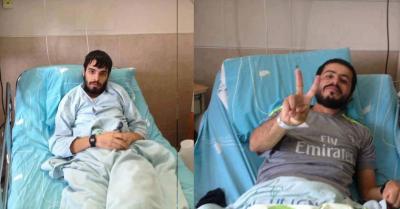
The two hunger strikers, Anas Shadeed and Ahmad Abu Farah, 20 and 29 years old, have decided to continue their hunger strike and refuse water after their appeal to end their administrative detention was rejected by the Supreme Court of Justice yesterday. We, the undersigned organisations, are both greatly concerned by the potential implications and by the Court’s implication that - contrary to the Malta Declaration - the medical staff should persuade the hunger strikers to break their strike and to treat them.
Shadeed and Abu Farah have been on hunger strike for 82 days in response to being placed in administrative detention on the 2nd of August. During the recent visit of an independent PHR-I physician, it was noted with respect to both that due to their weight loss, there was a severe impact on their muscle mass, including their heart muscles, and that if they continue their hunger strike “there is a risk of irreversible brain or physical injury, including real risk of death”. Moreover, medical literature indicates that death ensues within few days without water.
Abu Farah and Shadeed appealed to the High Court to remove their administrative detention order earlier this month and were refused, with the Court deciding to suspend their administrative detention order until they recover medically. As this leaves the hunger strikes at risk of recovering from their hunger strike only to be placed under administrative detention once more - Shadeed and Abu Farah appealed to the Supreme Court of Justice.
Although both courts can, in theory, cancel their administrative detention, in practice the courts in Israel rarely choose to exercise this power. This time, moreover, the Supreme Court of Justice stated that “the medical center [where they are currently held] will continue all efforts to convince them to end their strike and to treat them”. Yet the Malta Declaration specifically states that physicians must benefit those they treat, which includes “ not forcing treatment upon competent people nor coercing them to stop fasting”. Moreover, any force treatment, including force feeding, is also explicitly contrary to the UN Committee Against Torture’s Concluding Observations, which states that Israel must guarantee that “persons deprived of liberty, competent to take informed decisions, who engage in hunger strikes are never subjected to feeding or other medical treatment against their will, as these are practices that may amount to torture or ill-treatment. It should also take the legislative and other measures necessary to ensure that persons deprived of liberty, competent to take informed decisions, who engage in hunger strikes are never subjected to feeding or other medical treatment against their will, as these are practices that may amount to torture or ill-treatment”.
It is unclear whether Abu Farah and Shadeed, like other hunger strikers before them, will end up reaching an agreement with the Israeli authorities at the last moment. This has happened in case after case, and has essentially enabled the Israeli authorities to deal on a case by case basis with hunger strikers, avoid their death and the resultant political and media firestorm while not needing to deal with the root of the hunger strikes - the use of administrative detention, a practice which has increased in use in the past few years. If a deal is not struck in the next week or so, Abu Farah and Shadeed may die.
In light of the potentially swift deterioration in the health of the hunger strikers, and based on the recent statement of the EU Representative and Heads of Missions in Jerusalem and Ramallah , previous statements by the EEAS that this issue is on the top of the EU agenda and the EU Guidelines on Torture, we would respectfully request you to provide the necessary leadership and:
● Publicly voice concern for the hunger strikers and inform the Israeli authorities that as an occupying power hunger strikes are a legitimate form of protest which should not be met with punitive measures.
● Visit the Assaf Harofeh hospital where they are being held.
● Publicly voice concern over Israel’s continued use of administrative detention.
● Demand that the hunger strikers be freed.
Signing organizations: Adalah – The Legal Center for Arab Minority Rights in Israel, Addameer Prisoner Support and Human Rights Association, al Haq, Amnesty International Israel, Coalition of Women for Peace, PCATI - Public Committee against Torture in Israel, Plateforme des ONG françaises pour la Palestine, Physicians for Human Rights-Israel (PHRI).